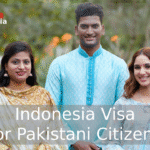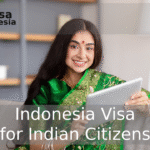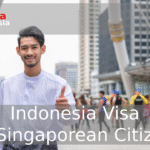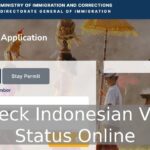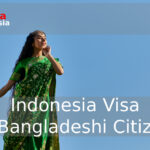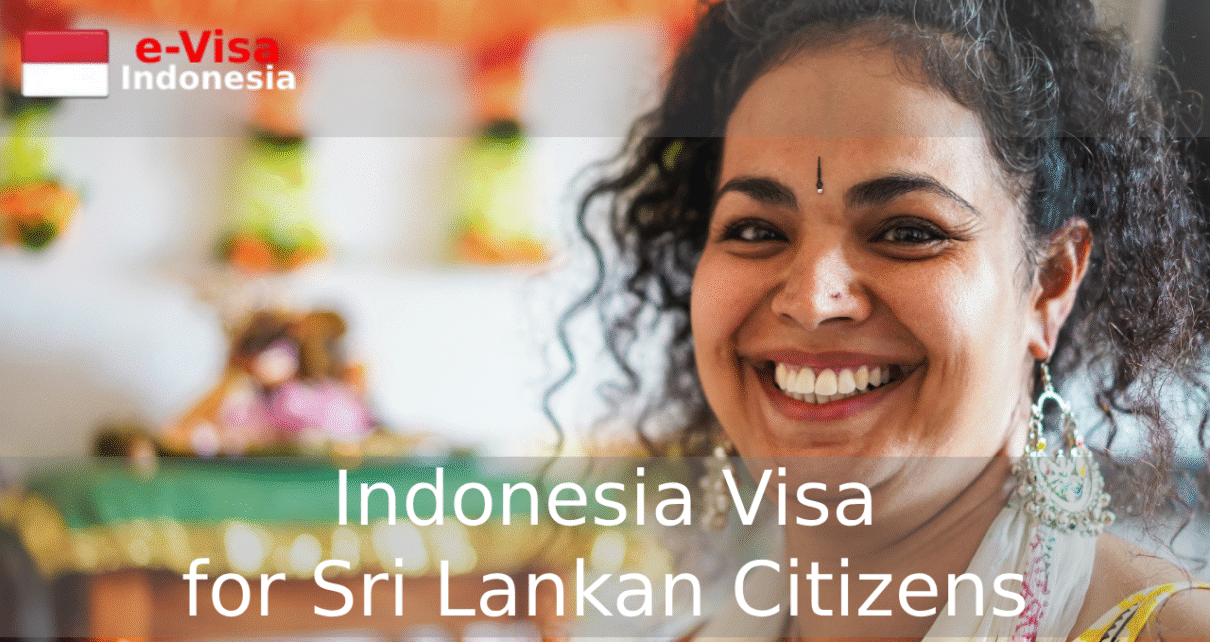
Sri Lankan citizens need to obtain a visa before traveling to Indonesia. They have the option to apply online or visit the nearest Indonesian Embassy or Consulate.
The Single-Entry C1 Tourist Visa is the most widely used, permitting an initial stay of 60 days. Also, the Indonesian eVOA (Electronic Visa on Arrival) is a popular choice among travelers, allowing eligible visitors to stay in Indonesia for up to 30 days, with a validity of 90 days.
The online Indonesia visa process is quick and user-friendly. Sri Lankan applicants must fill out the form, upload the required documents, and complete the payment.
Additionally, travelers from Sri Lanka should make sure their passports remain valid for at least 6 months beyond their date of entry into Indonesia.
NOTE: To avoid any delays in Indonesian visa processing, Sri Lankan nationals should double-check that all necessary documents are complete and correctly submitted.
Types of Indonesian Visas
Determining the correct visa type is crucial for a smooth trip to Indonesia. Each permit is designed for specific travel purposes, and Sri Lankan citizens can choose from the following options.
- Tourism Visas: Ideal for holidays, sightseeing, and short leisure stays. Typically valid for 30 to 60 days. Examples:
- B1 – Visa on Arrival (Tourism)
- C1 – Tourist Single-Entry Visitors Visa
- D1 – Tourist Multiple-Entry Visa
- Government and Business Visas: For official delegations, business meetings, corporate events, or pre-investment visits. These visas do not permit permanent employment. Examples:
- B4 – Visa on Arrival (Government or Business)
- C2 – Business Visit Visa
- C19 – Business Visa (After-Sales Services)
- Crew Visas: For crew members working on international ships, airlines, or other transport entering Indonesian territory. Examples:
- C13 – Foreign Crew Visa
- A36 and A37 Visa Exemption (Foreign Crew)
- Work and Training Visas: For temporary employment, entertainment projects, training assignments, and internships. Examples:
- C14 – Filmmaking and Entertainment Visa
- C22B Occupational Training Visa
- C16 – Invited Trainer Visa
- Study and Education Visas: Suitable for students, researchers, or participants in academic and training programs. Examples:
- E29 – Scientific Research Visa
- E30A – Student Visa (Formal Education)
- E30B – General Education Visa
- Family Visas: For individuals joining family members who live in Indonesia, including spouses, children, or parents. Examples:
- E31A – General Family Visa
- E31C – Visa for Children of Indonesian Parent(s)
- E31G – Visa for Parents of Indonesian Citizens
- Former Indonesian Citizens Visas: Designed to help former Indonesian nationals and their families return and stay for extended periods. Examples:
- E32A – Former Citizen Visa
- E32B – Visa for First- or Second-Degree Relatives
- E32D – Long-Term Stay (Up to 1 Year)
- Investment Visas: For individuals or companies planning to invest, start businesses, or open branches in Indonesia. Examples:
- E28A – General Investment Visa
- E28C – Non-Company Investment Visa
- E28D – Branch Office Establishment Visa
- Long-Term and Special Stay Visas: Designed for retirees, skilled professionals, and digital nomads. These allow longer stays without employment rights. Examples:
- E33 – Second Home Visa
- E33E – Elderly Visa (Retirement)
- E33G – Remote Worker Visa
- Medical Visas: For those seeking medical treatment or procedures in Indonesia. Examples:
- C3 – Short-Term Medical Visa
- D3 – Extended Medical Treatment Visa
- Culture, Arts, and Media Visas: For media professionals, cultural performers, artists, and those engaged in creative projects.
- C5 – Media and Press Visa
- C7 – Art & Cultural Activity Visa
- D14 – Film Production and Creative Work Visa
- Sports Visas: For athletes, coaches, or officials participating in sports events, competitions, or training. Examples:
- C8A / D8A – Athlete Visas
- C8B / D8B – Officials and Coach Visas
- Other Special Visas: Issued for specific needs such as legal matters, religious duties, and technical inspections. Examples:
- C21 – Judicial Proceedings Visa
- C10A – Religious Preaching/Missionary Visa
Each visa category is designed for distinct purposes, ensuring that individuals from Sri Lanka can participate in their respective activities while meeting Indonesian regulations.
Required Documents for Visa Applications
To successfully apply for a visa, Sri Lankan nationals must make sure they provide all needed documentation.
Commonly required files include a passport with a minimum validity of 6 months, a completed visa form, and a recent face photograph.
Depending on the visa category, additional conditions such as proof of financial means, an invitation letter, or a work permit may be needed.
It is crucial to check the specific rules for each Indonesian visa type to avoid delays or rejections.
How to Apply for an Indonesian Visa
A submission is necessary to receive the appropriate visa for the intended activities in Indonesia.
The process of securing an Indonesian Electronic Visa on Arrival for Sri Lankan citizens is straightforward if you follow these steps:
- Start the application. Visit evisa.imigrasi.go.id and click the “Apply” button on the homepage to begin.
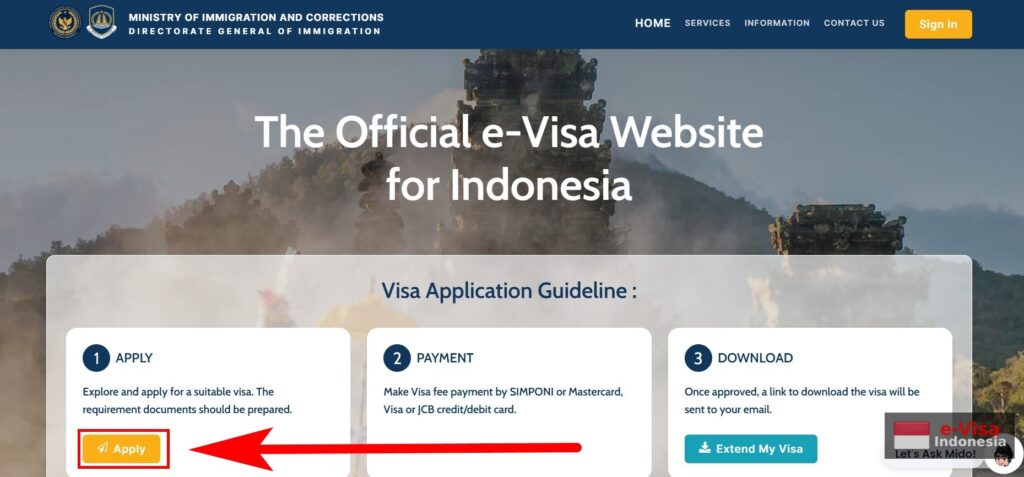
- Select the country and travel purpose. Choose your passport-issuing country from the dropdown list.
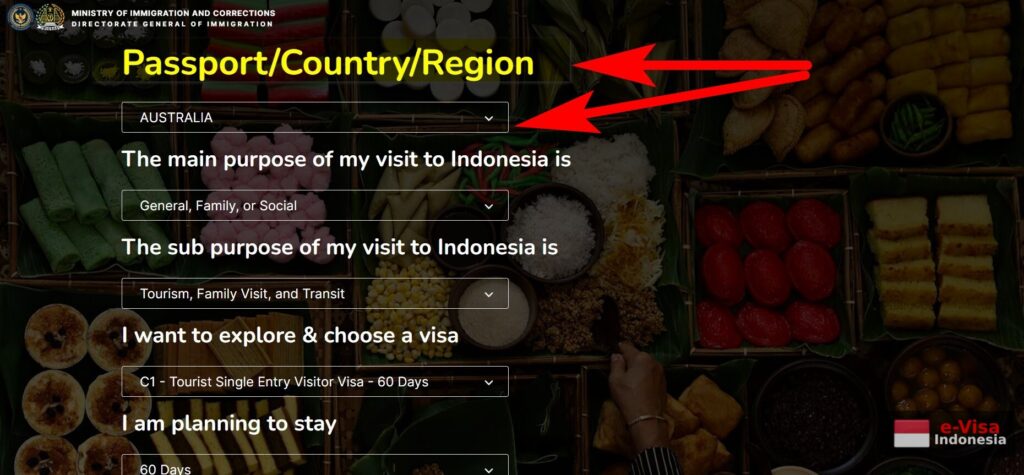 Then, select the primary purpose of visit (e.g., tourism, business, study).
Then, select the primary purpose of visit (e.g., tourism, business, study). 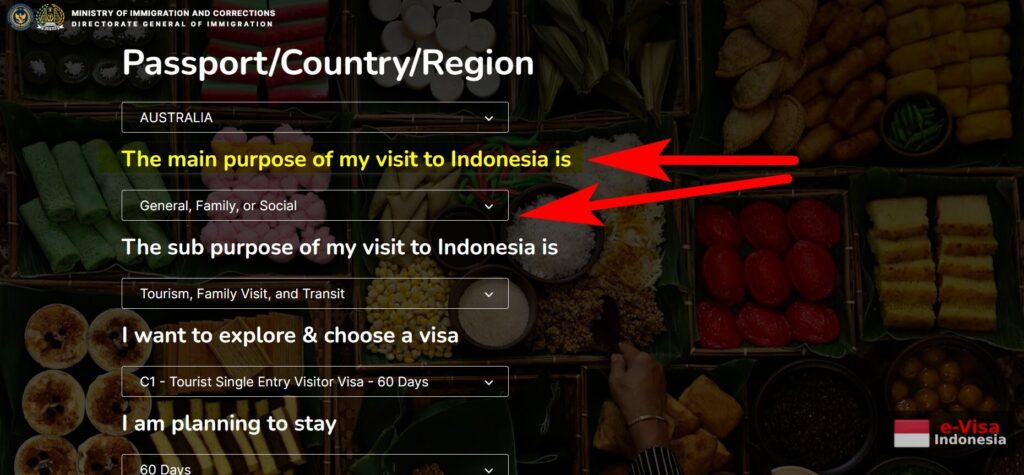 Based on that, pick a sub-category that best describes the reason for your trip.
Based on that, pick a sub-category that best describes the reason for your trip.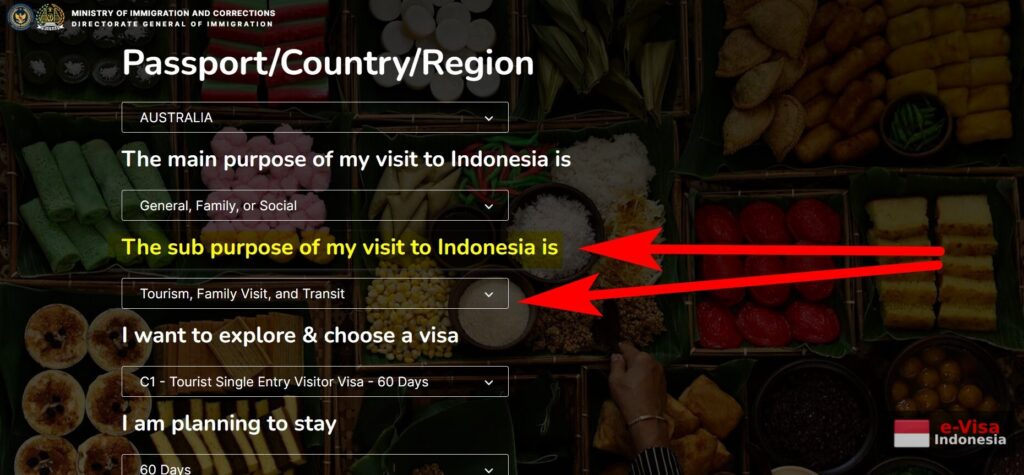
- Choose visa type and duration. Based on the selected purpose and sub-purpose, choose the appropriate visa type.
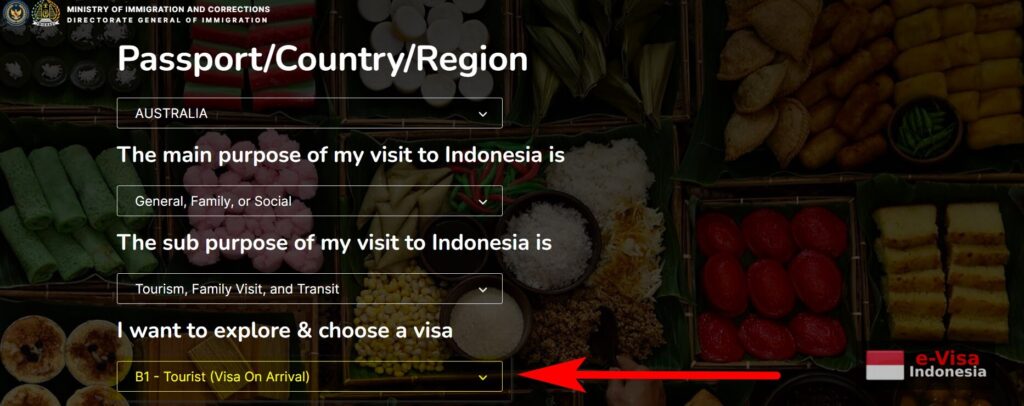 Then, select how long you plan to stay in Indonesia.
Then, select how long you plan to stay in Indonesia.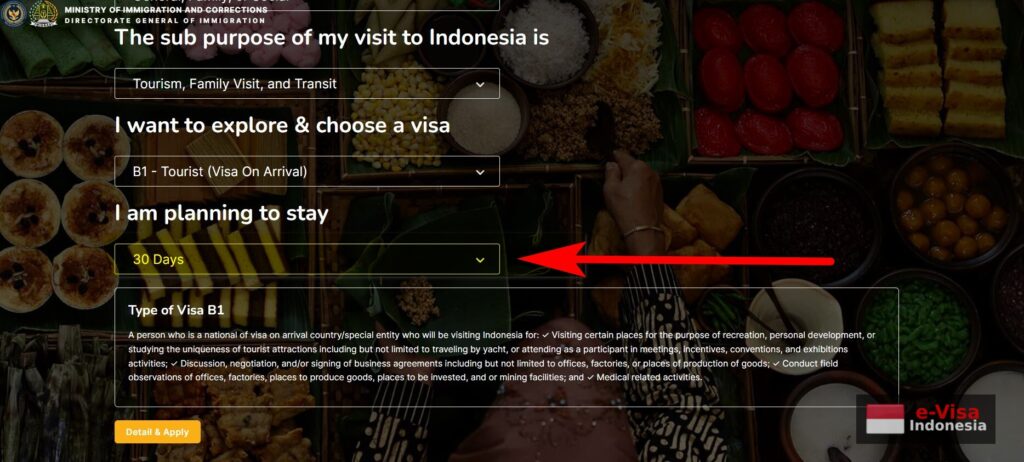
- Proceed to the details. Click “Detail & Apply” to move forward.
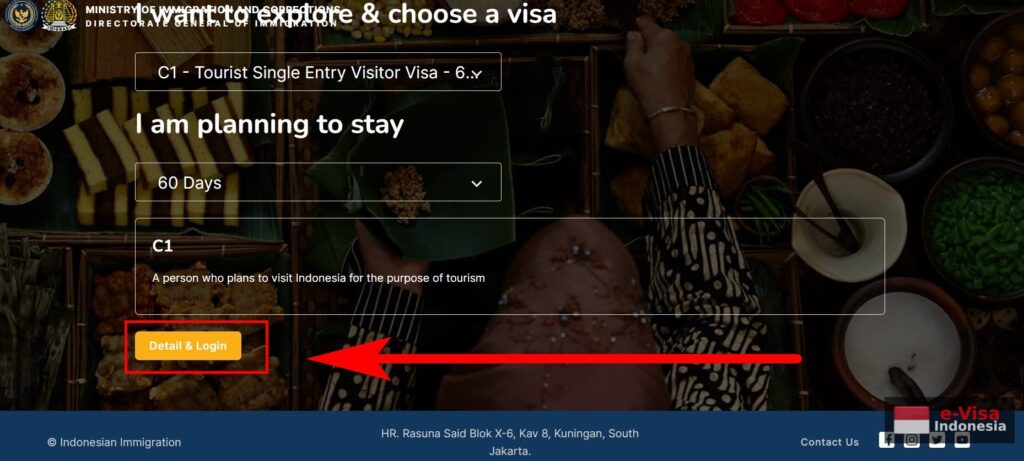 Carefully review the information provided about the visa type. Once confirmed, click “Apply” to continue.
Carefully review the information provided about the visa type. Once confirmed, click “Apply” to continue.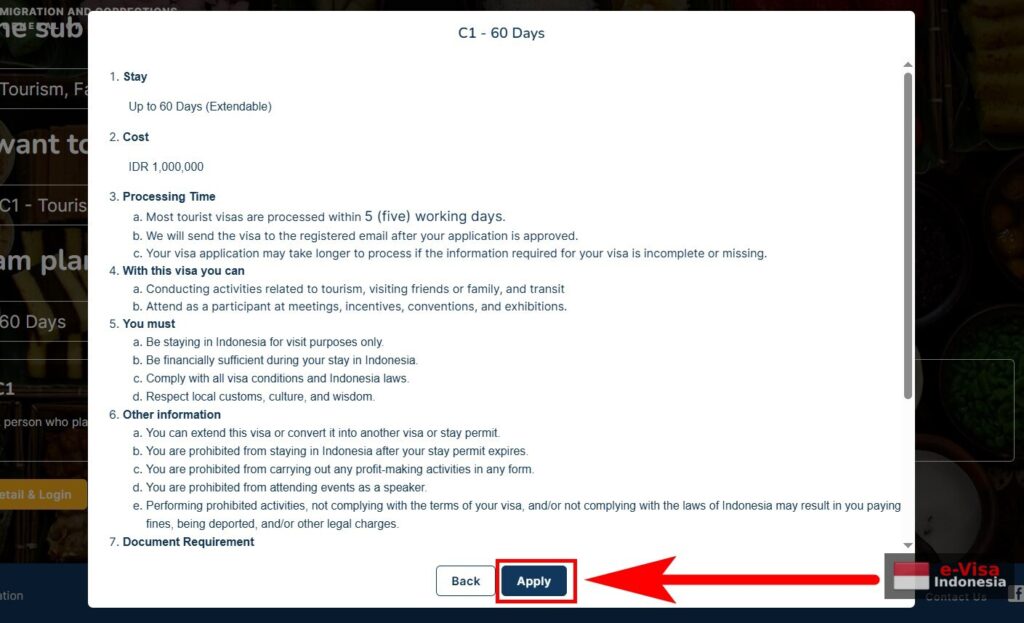
- Upload initial documents. Upload a clear scan of the passport and a recent formal photo that meets the specified requirements. Click “Next” when done.
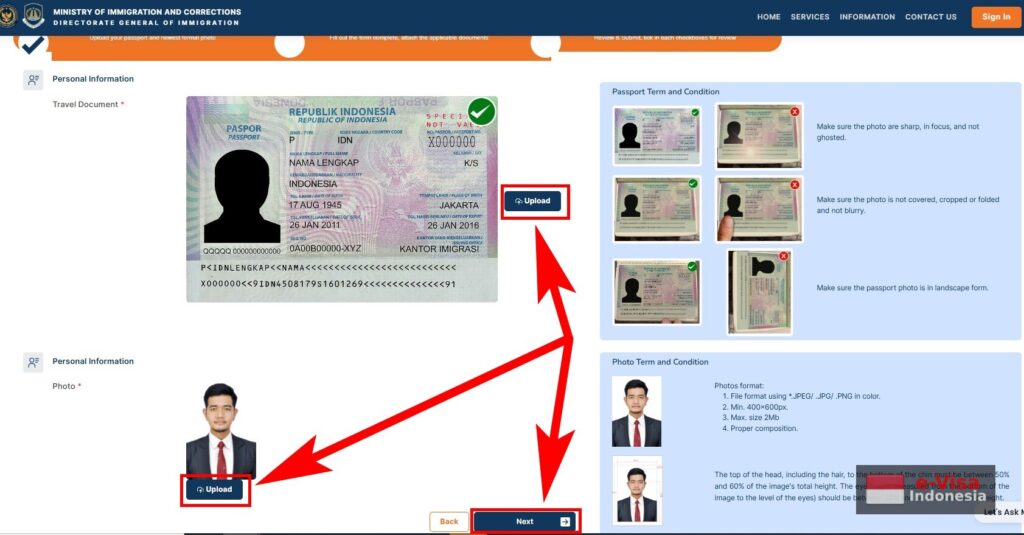
- Fill in personal and passport information. Enter the details, including full name, date of birth, gender, and contact number. Then, provide your passport number, nationality, issuing country, and expiration date.
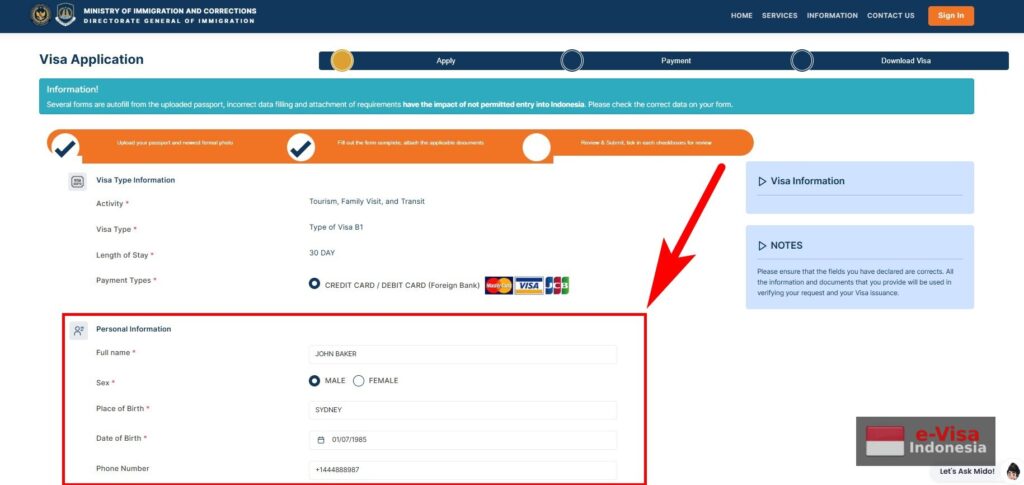

- Provide the Indonesian address. Specify your accommodation in Indonesia—this could be a hotel, rental home, or family residence.

- Upload supporting documents. Attach the required documents in PDF format: A passport valid for at least 6 months (or 12 months for temporary/emergency passports) and a return or onward travel ticket.

- Confirm contact details. Enter and verify the email address, then click “Next” to continue.

- Review and save the application. Double-check all the entered information. Tick the checkboxes to confirm accuracy, then click “Save.”
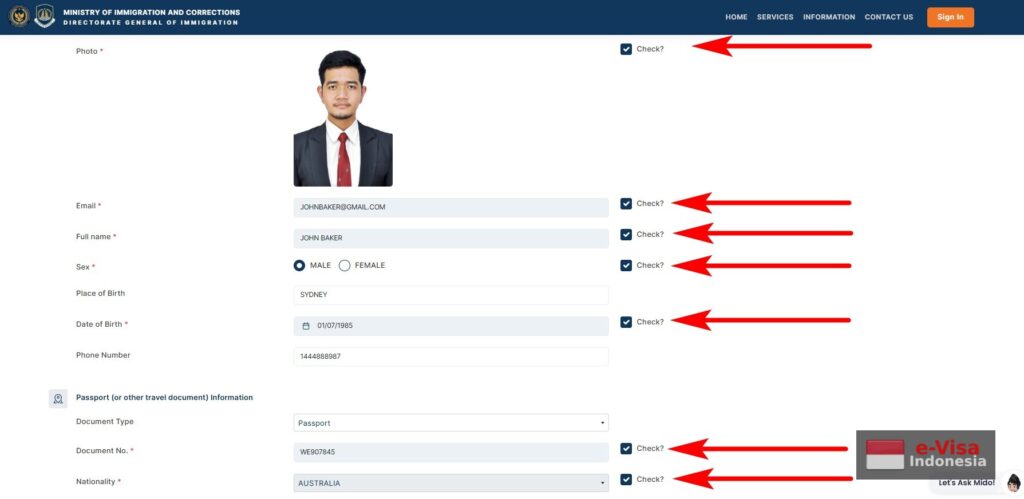
- Submit and proceed to payment. Click “Submit” to finalize the procedure. Be cautious—only trust emails from no-reply@imigrasi.go.id and make payments directly through evisa.imigrasi.go.id.
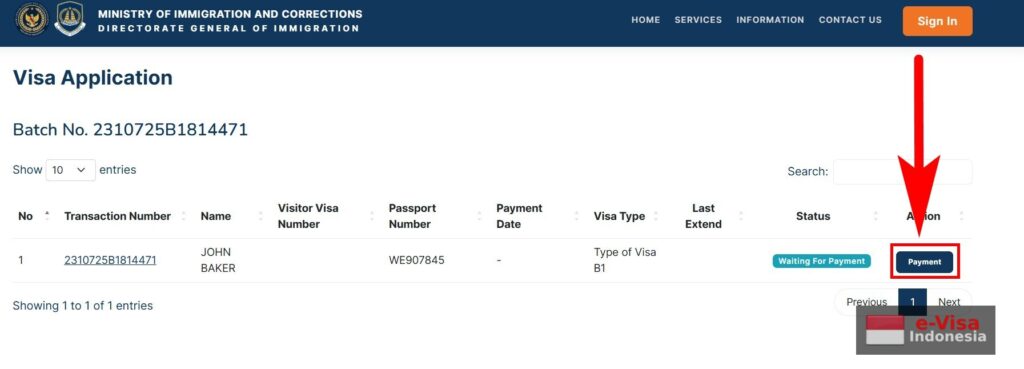
- Cover the fee. After a final review, click “Payment” to proceed. Enter your payment details and click “Pay Now.” Make sure to complete the transaction within 120 minutes, or the session will expire.
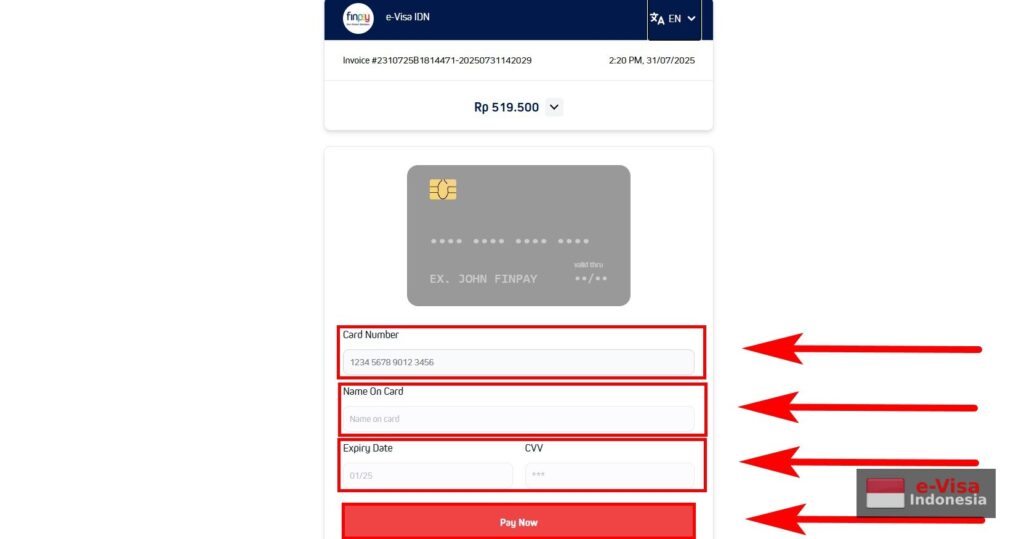
- Track the application. Processing typically takes up to 5 working days. You can log in anytime to check your visa status.
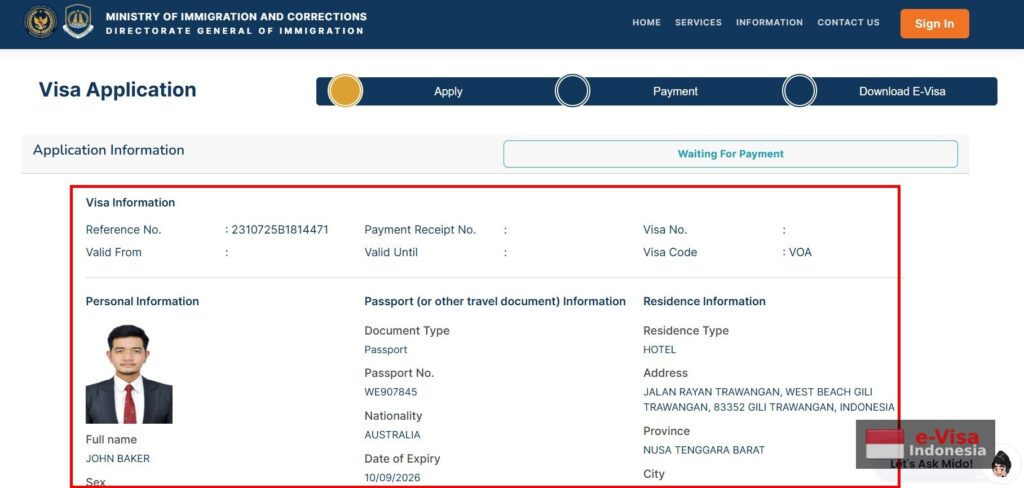
- Download and print the visa. Once approved, download your visa and print a copy. You must present this printed visa when entering Indonesia.
Make sure that all the information provided in the application is accurate and matches the travel documents to avoid any delays or rejections.
Processing Time of the Indonesian Visas
Indonesian visa processing times vary depending on the type, such as Tourist, Business, or Work Visas.
Factors such as the completeness of the documents and the volume of requests being handled at the time can significantly affect the waiting period.
For example, a Tourist Electronic Visa is usually processed within 5 business days, while e-VOA usually takes 24 hours.
It is always advisable to prepare accordingly and apply well in advance to avoid any unexpected delays.
Indonesian Visa: Stay, Validity, and Extensions
The possible length of stay and overall validity of Indonesian visas depend on the type of permit selected and the traveler’s intended activities while in the country.
Sri Lankan nationals visiting Indonesia for tourism can obtain the C1 Single-Entry Tourist Visa, which allows a stay of up to 60 days within a 90-day validity period.
It can be prolonged (extension must be applied for before the initial stay expires and is subject to approval by Indonesian immigration).
Entry Requirements to Indonesia
If you’re flying from Sri Lanka to Indonesia, it’s essential to follow all the necessary entry guidelines to avoid complications upon arrival.
Besides obtaining a visa, make sure you’re prepared with:
- Passport: It must have at least 6 months of validity from your planned date of arrival.
- Tourist levy: A fee of 150,000 Indonesian rupiah (about £8) must be paid.
- Health form: Complete the SATUSEHAT Health Pass, an electronic self-declaration, before entering the country.
- Vaccination proof: If you’re coming from a yellow fever risk area, you must show valid vaccination documentation.
- Return or onward ticket: proving that you intend to leave the country.
Travelers from Sri Lanka who don’t follow these entry rules may be refused entry into Indonesia.
Indonesian Embassy for Sri Lankan Citizens
The Indonesian Embassy in Sri Lanka is the primary point of contact for visa applications and inquiries.
Sri Lankan citizens should make sure that all required documents, including a valid passport and recent photographs, are prepared prior to submission.
It is advisable to contact the embassy directly for the most accurate and up-to-date information regarding visa policies and procedures.
- Address: 400/50, Sarana Road, Colombo 7, Sri Lanka.
- Phone: (94-11) 267 43 37
- Email: colombo.kbri@kemlu.go.id
FAQs about the Indonesian Visas
- Do Sri Lankans need a visa for Indonesia?
Depending on your travel purpose, you’ll need a Tourist Visa, Business Visa, or another applicable visa.
- Can I extend my Indonesian visa?
Most visa types, including a Tourist Visa, can be extended. Submit the extension request before the current visa expires.
- What are typical processing times for Indonesian visas?
Many Tourist Electronic Visas take 5 business days, but other types may require additional time for processing.
- What is the penalty for overstaying in Indonesia?
Overstay fines are IDR 1,000,000 per day. Prolonged situation may result in deportation.
- Can I work in Indonesia with a Tourist Visa?
No, working in Indonesia with a Tourist Visa is not permitted. To be employed legally, you must obtain a work permit and the appropriate visa.
- Do I need a visa to visit Bali?
Yes, Bali is part of Indonesia, so the visa requirements also apply there. As a Sri Lankan, you must have a visa.
Conclusion
Sri Lankan citizens must have a visa to enter Indonesia, including popular destinations like Bali. It is essential to make sure that you have the right type of visa for your intended activities, whether it’s tourism, business, or employment.
Staying informed about Indonesian visa regulations and complying with them will help you avoid fines, legal issues, or deportation.
For accurate and up-to-date visa details, it is always a good idea to contact the Indonesian Embassy or Consulate in Sri Lanka.
Sources
Hi, I’m Kartini Sisingamaraja! I’m an Indonesian travel blogger and a migration and visa expert with years of experience, including working for Indonesia’s Ministry of Immigration and Corrections. Traveling is my passion, and I love sharing my adventures, tips, and insights to help others explore the world with ease. Whether you’re looking for hidden gems in Indonesia or need guidance on visas and migration, I’m here to make your journey smoother and more exciting. Let’s explore together!


